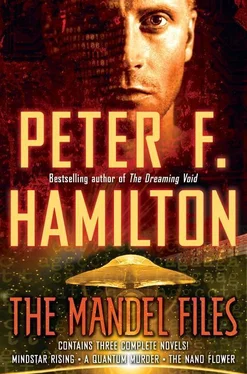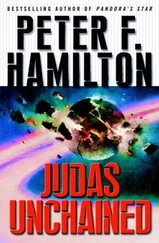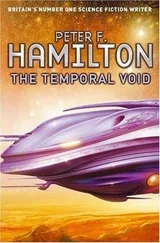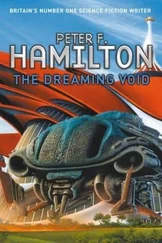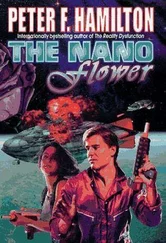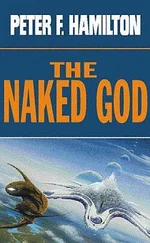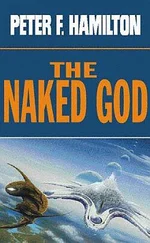Eddie Coghian frowned, trying to place the name. “Not the SETI project director?”
“Yes.”
“Oh, right.” He glanced at his watch. “I suppose he’ll be in by now.”
Dr Rick Parnell’s personnel profile said he was thirty-seven, which surprised Victor. Himself apart, Event Horizon’s divisional chiefs were normally in their fifties. When he accessed the Astronautics Institute’s records he found out why. SETI was about the smallest project on Event Horizon’s books, with only twelve members. Julia funded it out of the pure science budget; the project was virtually a token, she was simply covering all aspects of space research, however remote.
Victor certainly hadn’t known it existed, not until Julia suggested he go and see if they could come up with any suggestions about how to find the alien starship. She was anxious that Greg’s tenuous pursuit of the Newfields girl wasn’t the only option of making contact with them.
The Search for Extra-Terrestrial Intelligence project had been allocated three offices on the inward side of Building One’s ring; the usual array of desks and terminals and holographic display cubes, worn dark-green carpet squares. Victor was mildly disappointed, expecting something more elaborate for this kind of project, at least. His own office wasn’t much different, larger with better furniture.
He left Eddie Coghlan to organize the tekmerc busts and went in. The SETI staff gave him and his bodyguard inquisitive stares; all of them were in their twenties, he noted. An attractive female secretary directed him to Rick Parnell’s office.
The room looked out over the assembly hall, an incomprehensible mini-city of cybernetic machinery, its roadways heavy with little white carts and drone cargo flat-tops following buried guidance tracks. On the far side he could see a curving row of integration bays where standard payload pods were fitted out, each bay a buzz of activity. More pods were hanging from the overhead hoists, like a series of white moon-lets drifting along rectangular orbital paths.
The wall behind the SETI director’s desk was covered with holograms of satellites. To Victor’s eye they were similar to the geosync antenna platforms, although he guessed the outsized dishes were radio observatories. There was one computer simulation of a mesh dish alongside New London; if he was reading the scale right it was over twenty kilometres in diameter.
Dr Rick Parnell had his feet up on his desk, drinking a can of Ruddles bitter as he watched a data display in his terminal’s cube. He had been a varsity rugby player while he was at Oxford, half a head taller than Victor, with broad, sloping shoulders, and blond hair that was starting to thin. It looked like he worked hard to keep in trim. The body didn’t really belong in a white shirt and suit trousers, Victor thought, more like tennis kit.
“Security chief?” he asked after Victor showed his card. “What, you mean of the whole company?”
“That’s right.”
“You come to evict us?”
“No. I’d like to talk to you.”
Rick Parnell suddenly realized he was drinking a can of bitter in office hours. He drained it in a couple of gulps, crumpled it, and threw it into the bin. Perfect shot. “You don’t look old enough to be a security chief.”
Victor sat in front of the desk. “There aren’t many old people in security. We don’t survive that long.”
Rick Parnell managed a sickly smile. “What did you want to talk about?”
“Firstly, let me remind you of the confidentiality undertaking you thumbprinted when you were employed by Event Horizon.”
Rick Parnell coloured slightly. “Hey, now listen. I was told that was a formality. This project might not seem much to a guy like you, but we accomplish a lot, and most of that is because we’re mainly a co-ordination centre. Half our budget goes on grants to universities and agencies, we arrange international conferences, publish datasheets. You start restricting our output, and there’s no point to us even existing.”
“I’m not interested in restricting the flow of ideas, I simply ask that our conversation is not bandied about.”
“Otherwise I’m for the chop.”
Victor sat back in the chair and gave Rick Parnell a searching look. “Tekmercs make threats, Mr Director. I work on the other side of the fence. We try and ensure that a dedicated researcher’s life’s work isn’t stolen from under their nose, that the pension fund you’ve paid into for forty years doesn’t get emptied by some hotrod with a smart decryption program. Now, you and I are employed by the same lady, and she suggested I ask your professional advice on a matter I’m involved with. Is that really so hard for you?”
Rick Parnell twitched in discomfort. “No. Sorry, of course not. I’m just not used to the idea of the head of Event Horizon’s security division walking into my office. I didn’t think you people even knew we existed.” He lifted his head, as if he was sniffing at the air. “Julia Evans herself told you to come here? The Julia Evans?”
“Yes.”
“For professional advice?”
“Yes.”
“OK, fire away.”
“Hypothetically, if there was an alien spaceship in the solar system, how would I go about detecting it?”
Rick Parnell opened his mouth, closed it, then started again. “If an alien spaceship came into the solar system, believe me, you’d know about it. Something like that would be a bigger event than the Second Coming.”
Victor gazed thoughtfully at the hologram of the big dish. This was the second time he’d been told the arrival of aliens would be momentous. The prospect was beginning to worry him badly. “In what way?”
“Spectacular. OK, look. There’s two ways of travelling between the stars. In a small ship going very fast, say about thirty or fifty per cent lightspeed. Or a big multi-generation ship, something the size of New London, travelling at one or two per cent lightspeed. Either way, it takes a colossal amount of energy to move them. If anything like that started decelerating into the solar system, the plasma from the reaction drive would scream like a nova across the radio bands. We’d spot it half a light-year out. It would stop radio astronomy stone dead across half of the sky.”
“What if they didn’t use a reaction drive? What if they have some faster than light drive like the science fiction shows on the channels?”
“Christ, you’re really serious, aren’t you?”
“Yes.”
Rick Panel put his elbows on the desk, and rested his chin on his clasped hands. “Nick Beswick is the one you really should be asking about this, because it all fits in with quantum theory, but… FTL means producing wormholes through space-time large enough for a ship to pass through. Now wormholes are theoretically possible, but we haven’t got a clue how to open one.”
“An advanced technology might be able to achieve it.”
“Granted, an extremely fanciful technology could stress space to a degree that tears it open. However, even if you have that level of technology you still couldn’t enter the solar system without being detected. If the terminus of a wormhole on this scale erupted near Earth, its gravitational distortion would be of epic proportions. To my knowledge there are three hundred and twenty functional gravity-wave detectors on this planet, fifteen of which are in orbit; astrophysicists use them to check out general relativity. They would have spotted it.”
“What about an FTL system that used something other than wonnholes?”
Rick Parnell frowned sadly. “You know, my problem is usually convincing people that aliens do exist. Now you come in, and I have to persuade you what you’re saying doesn’t make any sense. This universe is no different for aliens than it is to us, it obeys the same physical parameters ten million light-years away as it does right in this office. That includes relativity.”
Читать дальше
